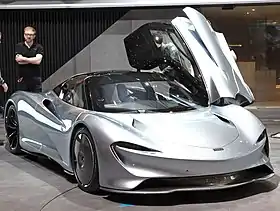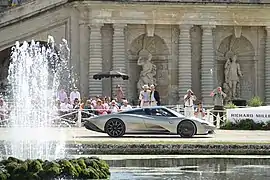McLaren Speedtail
The McLaren Speedtail is a limited-production hybrid sports car manufactured by McLaren Automotive. This car is the fourth addition in the McLaren Ultimate Series, after the Senna, the P1, and the F1. The car is also part of the 18 new cars or derivatives that McLaren will launch as part of its Track22 business plan. The Speedtail was unveiled on October 26, 2018.
| McLaren Speedtail | |
|---|---|
 | |
| Overview | |
| Manufacturer | McLaren Automotive |
| Production | 2020–present |
| Assembly | England: Woking, Surrey (McLaren Technology Centre) |
| Body and chassis | |
| Class | Sports car (S) Grand tourer |
| Body style | 2-door coupe |
| Layout | Rear mid-engine, rear-wheel-drive |
| Doors | Dihedral |
| Related | |
| Powertrain | |
| Engine | 4.0 L M840T twin-turbocharged V8 with parallel hybrid system eMotor |
| Electric motor | 230 kW (310 hp; 310 PS) MAT & Hewland e-Axle Permanent magnet motor |
| Power output | 772 kW (1,035 hp; 1,050 PS) |
| Transmission | 7-speed Graziano dual-clutch automatic |
| Hybrid drivetrain | Parallel Hybrid |
| Battery | 1.647 kWh lithium-ion battery |
| Dimensions | |
| Length | 5,137 mm (202.2 in) |
| Kerb weight | 1,430 kg (3,153 lb) |
| Chronology | |
| Predecessor | McLaren F1 |
Slated for release in February 2020, the car recharges while driving.[1]
Specifications
The Speedtail is powered by a modified M840T from the 720S and a hybrid powertrain to generate 1,036 hp (773 kW; 1,050 PS).[2][3] The Speedtail uses a carbon fibre monocoque, with the passenger seats integrated into the chassis, as well as dihedral doors like other McLaren models.
Performance
The company claims that the Speedtail has a top speed of 402.3 km/h (250 mph) and can accelerate from 0–299 km/h (0–186 mph) in 12.8 seconds.[4][5]
Technology
The car recharges while driving, though a wireless charging pad is included with the car, trickle-charging it when not in use.[1]
The Speedtail is fitted with electrochromic glass, which darkens at the push of a button, eliminating the need for sun visors and also incorporates LED lights in the interior. Similarly, the Speedtail does not feature door mirrors, instead of using HD cameras mounted on the front guards that pop out when the ignition is turned on, and retract inside when the "Velocity mode" is activated, which the company states are to reduce drag.[6] The front wheels feature carbon fibre static covers to further reduce drag. On the exterior, it features hydraulically actuated active rear aerodynamic control surfaces, which are formed in flexible carbon fibre and are an integral part of the rear clamshell.[7]
Interior
The Speedtail has a 3-seat layout, similar to the preceding F1, which has the driver sitting at the centre of the car, and slightly forward of the two passenger seats. On the original F1, this layout was used to provide better visibility than a conventional seating layout. The interior of the Speedtail features "directional leather finish" which McLaren says “makes it easy to slide into the seat but then subtly holds the occupant in place while they drive.” and is strong enough that it can be used in place of carpet on the floor of the Speedtail. It also features "Titanium Deposition Carbon Fibre", which is when "a micron-thin layer of titanium is fused directly onto the weave and becomes an integral part of the carbon fibre’s construction.", as well as Thin-Ply Technology Carbon Fibre (TPT), consisting of countless 30 micron thick layers of carbon fibre. [8] The company also offers bespoke luggage for Speedtail owners, a practice implemented when the F1 went on sale.[9]
Production
Testing was done in Florida at the Kennedy Space Center at the Johnny Bohmer Proving Grounds. The shuttle landing runway was used for the tests. It also tested in tracks in Germany, Spain and Italy.[1]
In November 2018, McLaren planned to build 106 examples of the Speedtail, all of which have already been sold, at an MSRP of around £2.1 million. Due in part to its use of cameras in place of side mirrors and no side-mounted airbags, the Speedtail is not street legal in the United States, even though around 35% of the total cars were bought by American buyers. A spokeswoman for the company stated that the car may be legal, pending approval by NHTSA, to be imported into the U.S. under the “Show or Display” law, which exempts cars that are “historically or technologically significant" from NHTSA safety standards but requires that owners not drive the vehicle more than 2,500 miles in a 12-month period. McLaren has made it clear that they will not offer assistance with importing or registering the Speedtail in the U.S.[10]
Production of the McLaren Speedtail commenced in the United Kingdom after high-speed testing was completed by December 2019. The prototype XP2 version had "reached its terminal velocity more than 30 times," topping out at 250 mph (403 km/h), and able to go from a standstill to 186 mph (300km/h) in less than 13 seconds. The first deliveries, 106 cars, were slated for February 2020 to Woking, England.[1]
Gallery
References
- Cole, Craig. "McLaren Speedtail prototype hits 250-mph top speed more than 30 times". Cnet. Retrieved 24 December 2019.
- "McLaren Speedtail specs make it a worthy F1 successor". Motor Authority. 4 March 2018. Retrieved 27 October 2019.
- "McLaren Speedtail revealed in full before official debut". 26 October 2018. Retrieved 27 October 2018.
- "McLaren Speedtail Unveiled: Heir To The Throne". Retrieved 27 October 2018.
- "This is the 250mph McLaren Speedtail". Top Gear. 2018-10-26. Retrieved 2018-11-02.
- "McLaren's $2.25 million Speedtail hybrid boasts 250MPH speeds". Engadget. Retrieved 2018-11-02.
- Ballaban, Michael. "The 2019 McLaren Speedtail Has Flexible Carbon Fiber That Bends and It Goes 250 MPH". Jalopnik. Retrieved 2018-11-02.
- "McLaren Newsroom". media.mclarenautomotive.com. Retrieved 2018-11-02.
- "McLaren's $2.25 million Speedtail hybrid boasts 250MPH speeds". Engadget. Retrieved 2018-11-02.
- Lee, Kristen. "The 2019 McLaren Speedtail Isn't Quite Legal in the U.S." Jalopnik. Retrieved 2018-11-02.
.jpg.webp)
_-_50690710141.jpg.webp)

